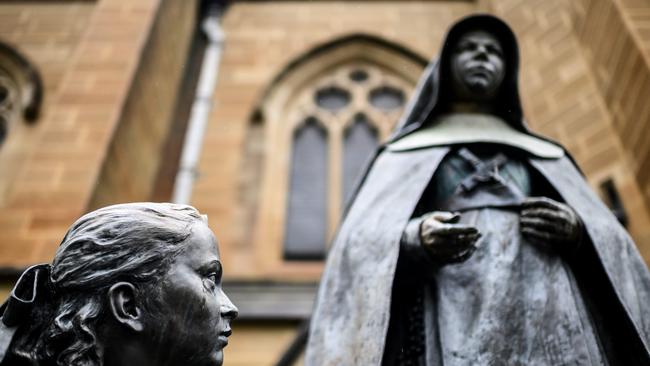
“Large numbers of children are perverted to Popery before their parents are aware of the true character of the teaching,” The Protestant Weekly reported in 1886, arguing that Catholic schools should be barred from government funding. Romanist education was “a false mean deceit” propagating “a religion degrading to the intellect and the heart as its design was simply to extract money”.
Such narrow sectarian prejudice would be deemed inappropriate in the 21st century by the guardians of diversity and inclusion, whose job is to make everybody feel comfortable.
Today, their intolerance extends to all forms of Christian education and, indeed, to any private school that undermines the monopoly of the state system. The Productivity Commission fired a particularly nasty salvo against religious schools, out of character for an organisation that once anchored its findings in data rather than the fashionable preconceptions of the intelligentsia.

In November, the Commission published a draft report recommending that donations to Christian school building funds should no longer be tax-deductible. The draft argued that the Deductible Gift Recipient status granted by the Australian Taxation Office to a wide range of registered charities was inappropriate since religious education had limited claim to a broader public purpose.
The PC argues that DGR donations require co-investment from taxpayers since a $100 donation from someone in the top income bracket saved them $35 in tax. This, the PC argues, is unfair since the priorities for public investment in schools should be decided by the government, not God-bothering tax dodgers.
They were not the exact words the PC used, but how else should we read a passage like this? “The Commission does not see a case for additional government support for the practice of religion through the DGR system.”
Or this? “Providing indirect government support through school building funds means government funding is not prioritised according to a systemic assessment of the infrastructure needs of different schools.”
The naive proposition that the government knows better where to spend public money than the public themselves sits awkwardly with the lessons from the Rudd government’s Building the Education Revolution program, a $16.2bn splurge on school infrastructure projects to stave off the recession that never was. The official report into the implementation of the BER by Brad Orgill found public schools in Queensland, NSW and Victoria paid 25 per cent more than Catholic schools and 55 per cent more than independent schools for near identical projects.
Yet the Commission doggedly insists that tax deductibility for donations to school building projects is unfair. It bolsters its argument with a peculiarly perverse interpretation of what constitutes private benefit. Potential donors are most likely to be people directly involved with the school, it claims, and are likely to reap the fruits of their donations as the parents of students or as alumni.

The Commission does not oppose tax-deductible donations per se. Indeed, it argues that they should be extended to a broader range of charities. Nor is it opposed to charities that want to build things, just those who like to build buildings that could be used for religious purposes.
It declares the building of social capital to be a worthy charitable ambition. Ditto is the building of bonds between individuals and communities, however loose that goal might be defined. Capacity-building activities for organisations and individuals get a tick, particularly the building of empowerment and self-determination by Aboriginal and Torres Strait Islander organisations. Indeed, the Commission recommends the establishment of an independent philanthropic foundation controlled by Aboriginal and Torres Strait Islander people for that very purpose.
It is religion to which the Commission seems to object. Not all of the 5000 school building funds that are currently endorsed are religious. Some three-quarters are for charities, and a quarter for government entities, such as public schools.
Yet the Commission wears its prejudices on its sleeve by mounting arguments exclusively against Christian schools rather than private schools. The concerns about tax-deductible proselytising do not extend to the 148 environmental charities with tax-deductible status.
The Commission does not question the broader public purpose of Boundless Earth Limited, which attracted $30.6m in revenue in its most recent annual report lodged with the Australian Charities and Not-for-profits Commission.

Boundless Earth gained its tax-deductible concession in 2021, stating its purpose is ”to accelerate climate solutions at the scale and speed required for Australia to do its fair share to avert the climate crisis”. Boundless Earth’s registered address is 13 Trelawney Street, Woollahra, the site of the former German consulate now owned by Mike Cannon-Brookes.
The Commission makes no recommendation that the projects and organisations Boundless Earth funds should be put on the public record, or suggest that Boundless should be declared an associated entity by the Australian Electoral Commission under the disclosure rules for political donations. And this would not be an unreasonable recommendation since Cannon-Brookes has made no secret of his financial support for the teal campaign at the last federal election.
The granting of DGR status to Boundless, Greenpeace, Lock The Gate, the Australian Solar Energy Society (which operates as the Smart Energy Council) the Climate Council, Farmers for Climate Action, Veterinarians for Climate Action and other members of the renewable energy cheer squad reinforces the growing concern that privileges of charitable status should be reviewed.

The Albanese government has prudently distanced itself from the Commission’s recommendations. “It’s not something we’re considering,” Assistant Education Minister Anthony Chisholm told a Senate committee last month.
The Commission is right to complain that the DGR system is poorly designed. It is piecemeal, overly complex and lacks a coherent policy rationale. It is responsible for inefficient, inconsistent and unfair outcomes for charities, donors and the community. It is badly in need of review.
Yet the draft report of the philanthropy inquiry is a small-minded, mean-spirited document unworthy of an organisation with a reputation for forensic and impartial examination of public policy. For the sake of their own reputation, the commissioners should find the courage to send the report back to its authors and ask them to start again.
Nick Cater is senior fellow at the Menzies Research Centre.







The insidious influence of Catholic schools was a matter of no small concern to the colonial establishment in the late 19th century, not least because of their devilish power to corrupt the youth.